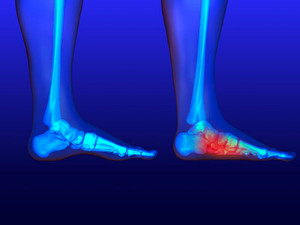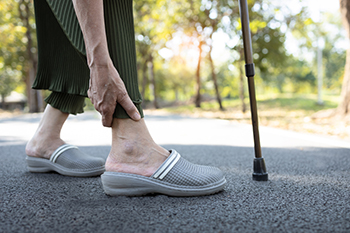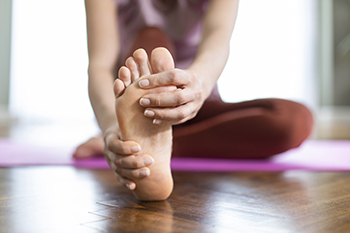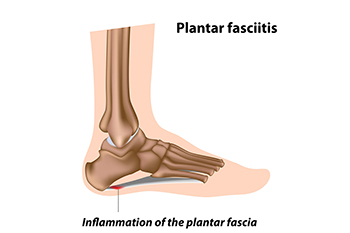Items filtered by date: November 2022
Adults May Retain Flat Feet From Birth

The medical term for flat feet is called pes planus. It is defined as a non-existent arch in the foot, and the majority of babies are born with this condition. The arch generally develops in the teenage years, and some adults never develop an arch. This is often a genetic trait, or it may happen from a foot injury. Additionally, medical conditions may lead to getting flat feet, consisting of rheumatoid arthritis, diabetes, and pregnancy. Some patients experience symptoms of flat feet, and these can include foot pain where the arch would be and swell on the inside of the ankle. The pain may get worse when activity is pursued, and the gait or walking style may be affected. Some patients find mild relief when specific stretches are performed, in addition to wearing custom-made orthotics. If you have flat feet, it is suggested that you confer with a podiatrist who can help you with relief techniques.
Flatfoot is a condition many people suffer from. If you have flat feet, contact one of our podiatrists from CyFair Family Foot Care. Our doctors will treat your foot and ankle needs.
What Are Flat Feet?
Flatfoot is a condition in which the arch of the foot is depressed and the sole of the foot is almost completely in contact with the ground. About 20-30% of the population generally has flat feet because their arches never formed during growth.
Conditions & Problems:
Having flat feet makes it difficult to run or walk because of the stress placed on the ankles.
Alignment – The general alignment of your legs can be disrupted, because the ankles move inward which can cause major discomfort.
Knees – If you have complications with your knees, flat feet can be a contributor to arthritis in that area.
Symptoms
- Pain around the heel or arch area
- Trouble standing on the tip toe
- Swelling around the inside of the ankle
- Flat look to one or both feet
- Having your shoes feel uneven when worn
Treatment
If you are experiencing pain and stress on the foot you may weaken the posterior tibial tendon, which runs around the inside of the ankle.
If you have any questions please feel free to contact our offices located in Cypress and Spring, TX . We offer the newest diagnostic and treatment technologies for all your foot and ankle needs.
Why You Should Care About Falls Prevention for Seniors

Although some people might not know about the severity of falls among senior citizens, this is a serious issue that affects a large portion of elderly Americans. A staggering number of elderly citizens are hospitalized annually because of an injury from falling —approximately 3 million. With this in mind, the concern of falling has become a public health issue among this older population. It is critical to note that preventing falls is a chief way in which a senior can protect their health, and one way they might go about doing this is by strengthening their feet. When a seniors’ feet are weak, they can become more susceptible to suffering from a fall of some sort. By strengthening the muscles in the feet, a senior can help guard against falls that could be potentially damaging and even deadly. If you are a senior citizen, it is a good idea to contact a podiatrist today for more information.
Preventing falls among the elderly is very important. If you are older and have fallen or fear that you are prone to falling, consult with one of our podiatrists from CyFair Family Foot Care. Our doctors will assess your condition and provide you with quality advice and care.
Every 11 seconds, an elderly American is being treated in an emergency room for a fall related injury. Falls are the leading cause of head and hip injuries for those 65 and older. Due to decreases in strength, balance, senses, and lack of awareness, elderly persons are very susceptible to falling. Thankfully, there are a number of things older persons can do to prevent falls.
How to Prevent Falls
Some effective methods that older persons can do to prevent falls include:
- Enrolling in strength and balance exercise program to increase balance and strength
- Periodically having your sight and hearing checked
- Discuss any medications you have with a doctor to see if it increases the risk of falling
- Clearing the house of falling hazards and installing devices like grab bars and railings
- Utilizing a walker or cane
- Wearing shoes that provide good support and cushioning
- Talking to family members about falling and increasing awareness
Falling can be a traumatic and embarrassing experience for elderly persons; this can make them less willing to leave the house, and less willing to talk to someone about their fears of falling. Doing such things, however, will increase the likelihood of tripping or losing one’s balance. Knowing the causes of falling and how to prevent them is the best way to mitigate the risk of serious injury.
If you have any questions, please feel free to contact our offices located in Cypress and Spring, TX . We offer the newest diagnostic and treatment technologies for all your foot care needs.
Common Causes of Toe Pain

Toe pain can arise from a variety of causes, but the most common include ingrown toenails, bunions, and blisters. Various types of arthritis and diabetes can also lead to toe pain. If you feel your toe is painful to the touch, shoes should be checked for a proper fit. They may be too tight, not supportive enough, or have heels that are too high. Resting and elevating the foot may also help relieve temporary toe pain. When there is redness, warmth, or swelling, there could be an infection requiring immediate medical attention. If you are having pain in your toes and it is not subsiding or is worsening, consult with a podiatrist who can diagnose the problem and provide the appropriate treatment for you.
Toe pain can disrupt your daily activities. If you have any concerns, contact one of our podiatrists of CyFair Family Foot Care. Our doctors can provide the care you need to keep you pain-free and on your feet.
What Causes Toe Pain?
Most severe toe pain is caused due to a sports injury, trauma from dropping something heavy on the toe, or bumping into something rigid. Other problems can develop over time for various reasons.
Toe pain can be caused by one or more ailments. The most common include:
- Trauma
- Sports injury
- Wearing shoes that are too tight
- Arthritis
- Gout
- Corns and calluses
- Hammertoe
- Bunions
- Blisters
- Ingrown toenails
- Sprains
- Fractures (broken bones)
- Dislocations
When to See a Podiatrist
- Severe pain
- Persistent pain that lasts more than a week
- Signs of infection
- Continued swelling
- Pain that prevents walking
Diagnosis
In many cases the cause of toe pain is obvious, but in others, a podiatrist may want to use more advanced methods to determine the problem. These can range from simple visual inspections and sensation tests to X-rays and MRI scans. Prior medical history, family medical history, and any recent physical traumatic events will all be taken into consideration for a proper diagnosis.
Treatment
Treatments for toe pain and injuries vary and may include shoe inserts, padding, taping, medicines, injections, and in some cases, surgery. If you believe that you have broken a toe, please see a podiatrist as soon as possible.
If you have any questions please feel free to contact our offices located in Cypress and Spring, TX . We offer the newest diagnostic tools and technology to treat your foot and ankle needs.
Tips for Healthy Trail Running

Most experts agree that running can improve your cardiovascular health, increase endurance, and boost mental well being. Experts have identified several ways to reap the rewards of trail running, which may involve uneven and sometimes unpredictable surfaces. The first thing to do is make sure you have footwear that is specifically designed for trail runs. These shoes provide the extra traction and specific cushioning needed as you may encounter rocks, tree roots, and streams. Second, your stride may need to be adjusted, which includes picking up your feet differently. While some road runners try to conserve energy by keeping their feet close to the ground, this can become a liability in trail running. Dirt can build up and actually slow the pace. Dehydration, muscle fatigue, glucose depletion, and inflammation can lead to injury. Fueling and hydrating before, during, and after runs is recommended. For more information on how to prevent injury while running, please consult a podiatrist.
Exercising your feet regularly with the proper foot wear is a great way to prevent injuries. If you have any concerns about your feet, contact one of our podiatrists of CyFair Family Foot Care. Our doctors will treat your foot and ankle needs.
How to Prevent Running Injuries
Many common running injuries are caused by overuse and overtraining. When the back of the kneecap starts wearing out and starts causing pain in your knee, this is commonly referred to as runner’s knee. Runner’s knee is a decrease in strength in your quadriceps and can occur if you’re not wearing properly fitted or supporting shoes. To prevent runner’s knee, focusing on hip strengthening is a good idea, as well as strengthening your quads to keep the kneecaps aligned.
What Are Some Causes of Running Injuries?
- One cause of a common running injury is called iliotibial band syndrome.
- Plantar fasciitis is also another common injury.
- Stress fractures can occur from overtraining, lack of calcium, or even your running style.
Best Ways to Prevent Running Injuries
- Wear footwear that fits properly and suits your running needs.
- Running shoes are the only protective gear that runners have to safeguard them from injury.
- Make a training schedule. Adding strengthening exercises as well as regular stretching can help keep you strong and limber and can lessen the possibility of injuries.
- Stretching keeps muscles limber; this will help you gain better flexibility.
If you have any questions please feel free to contact our offices located in Cypress and Spring, TX . We offer the newest diagnostic and treatment technologies for all your foot and ankle needs.
Are You Suffering From Ingrown Toenails?
Plantar Fasciitis and Swimming

One of the most common forms of heel pain that a podiatrist will encounter in patients is known as plantar fasciitis, a condition where the plantar fascia becomes inflamed. Many physical activities and sports may exacerbate this condition, particularly if it is high impact. However, in some respects, swimming may seem to be a helpful alternative for those with plantar fasciitis. Swimming is particularly low impact, enabling the athlete to burn calories while often not placing high pressure on the feet. It is important to note, however, that if someone has plantar fasciitis, it is possible that they still may experience pain when engaging in this activity. Someone with a particularly bad case of plantar fasciitis may feel pain if they try to push off of the wall with their feet when swimming. Schedule an appointment today with a podiatrist to learn more about plantar fasciitis.
Plantar fasciitis is a common foot condition that is often caused by a strain injury. If you are experiencing heel pain or symptoms of plantar fasciitis, contact one of our podiatrists from CyFair Family Foot Care. Our doctors can provide the care you need to keep you pain-free and on your feet.
What Is Plantar Fasciitis?
Plantar fasciitis is one of the most common causes of heel pain. The plantar fascia is a ligament that connects your heel to the front of your foot. When this ligament becomes inflamed, plantar fasciitis is the result. If you have plantar fasciitis you will have a stabbing pain that usually occurs with your first steps in the morning. As the day progresses and you walk around more, this pain will start to disappear, but it will return after long periods of standing or sitting.
What Causes Plantar Fasciitis?
- Excessive running
- Having high arches in your feet
- Other foot issues such as flat feet
- Pregnancy (due to the sudden weight gain)
- Being on your feet very often
There are some risk factors that may make you more likely to develop plantar fasciitis compared to others. The condition most commonly affects adults between the ages of 40 and 60. It also tends to affect people who are obese because the extra pounds result in extra stress being placed on the plantar fascia.
Prevention
- Take good care of your feet – Wear shoes that have good arch support and heel cushioning.
- Maintain a healthy weight
- If you are a runner, alternate running with other sports that won’t cause heel pain
There are a variety of treatment options available for plantar fasciitis along with the pain that accompanies it. Additionally, physical therapy is a very important component in the treatment process. It is important that you meet with your podiatrist to determine which treatment option is best for you.
If you have any questions, please feel free to contact our offices located in Cypress and Spring, TX . We offer the newest diagnostic and treatment technologies for all your foot care needs.

